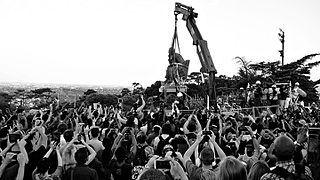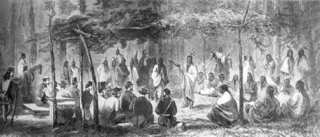
Food sovereignty is a food system in which the people who produce, distribute, and consume food also control the mechanisms and policies of food production and distribution. This stands in contrast to the present corporate food regime, in which corporations and market institutions control the global food system. Food sovereignty emphasizes local food economies, sustainable food availability, and centers culturally appropriate foods and practices. Changing climates and disrupted foodways disproportionately impact indigenous populations and their access to traditional food sources while contributing to higher rates of certain diseases; for this reason, food sovereignty centers indigenous peoples. These needs have been addressed in recent years by several international organizations, including the United Nations, with several countries adopting food sovereignty policies into law. Critics of food sovereignty activism believe that the system is founded on inaccurate baseline assumptions; disregards the origins of the targeted problems; and is plagued by a lack of consensus for proposed solutions.
Interculturalism is a political movement that supports cross-cultural dialogue and challenging self-segregation tendencies within cultures. Interculturalism involves moving beyond mere passive acceptance of multiple cultures existing in a society and instead promotes dialogue and interaction between cultures. Interculturalism is often used to describe the set of relations between indigenous and western ideals, grounded in values of mutual respect.
Indigenous land rights are the rights of Indigenous peoples to land and natural resources therein, either individually or collectively, mostly in colonised countries. Land and resource-related rights are of fundamental importance to Indigenous peoples for a range of reasons, including: the religious significance of the land, self-determination, identity, and economic factors. Land is a major economic asset, and in some Indigenous societies, using natural resources of land and sea form the basis of their household economy, so the demand for ownership derives from the need to ensure their access to these resources. Land can also be an important instrument of inheritance or a symbol of social status. In many Indigenous societies, such as among the many Aboriginal Australian peoples, the land is an essential part of their spirituality and belief systems.
Traditional knowledge (TK), indigenous knowledge (IK), folk knowledge, and local knowledge generally refer to knowledge systems embedded in the cultural traditions of regional, indigenous, or local communities.
Indigenous decolonization describes ongoing theoretical and political processes whose goal is to contest and reframe narratives about indigenous community histories and the effects of colonial expansion, cultural assimilation, exploitative Western research, and often though not inherent, genocide. Indigenous people engaged in decolonization work adopt a critical stance towards western-centric research practices and discourse and seek to reposition knowledge within Indigenous cultural practices.

The Declaration on the Rights of Indigenous Peoples is a legally non-binding resolution passed by the United Nations in 2007. It delineates and defines the individual and collective rights of indigenous peoples, including their ownership rights to cultural and ceremonial expression, identity, language, employment, health, education, and other issues. Their ownership also extends to the protection of their intellectual and cultural property. The declaration "emphasizes the rights of Indigenous peoples to maintain and strengthen their own institutions, cultures and traditions, and to pursue their development in keeping with their own needs and aspirations." It "prohibits discrimination against indigenous peoples," and it "promotes their full and effective participation in all matters that concern them and their right to remain distinct and to pursue their own visions of economic and social development".

Indigenous intellectual property is a term used in national and international forums to describe intellectual property that is "collectively owned" by various Indigenous peoples, and by extension, their legal rights to protect specific such property. This property includes cultural knowledge of their groups and many aspects of their cultural heritage and knowledge, including that held in oral history. In Australia, the term Indigenous cultural and intellectual property, abbreviated as ICIP, is commonly used.

Indigenous archaeology is a sub-discipline of Western archaeological theory that seeks to engage and empower indigenous people in the preservation of their heritage and to correct perceived inequalities in modern archaeology. It also attempts to incorporate non-material elements of cultures, like oral traditions, into the wider historical narrative. This methodology came out of the global anti-colonial movements of the 1970s and 1980s led by aboriginal and indigenous people in settler-colonial nations, like the United States, Canada, and Australia. Major issues the sub-discipline attempts to address include the repatriation of indigenous remains to their respective peoples, the perceived biases that western archaeology's imperialistic roots have imparted into its modern practices, and the stewardship and preservation of indigenous people's cultures and heritage sites. This has encouraged the development of more collaborative relationships between archaeologists and indigenous people and has increased the involvement of indigenous people in archaeology and its related policies.
The Blue Water Thesis or Salt Water Thesis, was a limited decolonization approach arising from United Nations General Assembly Resolution 637, which linked self-determination with non-self-governing territories.
Native American feminism or Native feminism is, at its root, understanding how gender plays an important role in indigenous communities both historically and in modern-day. As well, Native American feminism deconstructs the racial and broader stereotypes of indigenous peoples, gender, sexuality, while also focusing on decolonization and breaking down the patriarchy and pro-capitalist ideology. As a branch of the broader Indigenous feminism, it similarly prioritizes decolonization, indigenous sovereignty, and the empowerment of indigenous women and girls in the context of Native American and First Nations cultural values and priorities, rather than white, mainstream ones. A central and urgent issue for Native feminists is the Missing and murdered Indigenous women crisis.
Indigenous feminism is an intersectional theory and practice of feminism that focuses on decolonization, Indigenous sovereignty, and human rights for Indigenous women and their families. The focus is to empower Indigenous women in the context of Indigenous cultural values and priorities, rather than mainstream, white, patriarchal ones. In this cultural perspective, it can be compared to womanism in the African-American communities.
Indigenous planning is an ideological approach to the field of regional planning where planning is done by Indigenous peoples for Indigenous communities. Practitioners integrate traditional knowledge or cultural knowledge into the process of planning. Indigenous planning recognizes that "all human communities plan" and that Indigenous communities have been carrying out their own community planning processes for thousands of years. While the broader context of urban planning, and social planning includes the need to work cooperatively with indigenous persons and organizations, the process in doing so is dependent on social, political and cultural forces.
Data sovereignty is the idea that data are subject to the laws and governance structures of the nation where they are collected. The concept of data sovereignty is closely linked with data security, cloud computing, network sovereignty and technological sovereignty. Unlike technological sovereignty, which is vaguely defined and can be used as an umbrella term in policymaking, data sovereignty is specifically concerned with questions surrounding the data itself. Data sovereignty as the idea that data is subject to the laws and governance structures within one nation is usually discussed in one of two ways: in relation to Indigenous groups and Indigenous autonomy from post-colonial states, or in relation to transnational data flow. The latter case is dealt with extensively in a new anthology. With the rise of cloud computing, many countries have passed various laws around the control and storage of data, which all reflect measures of data sovereignty. More than 100 countries have some sort of data sovereignty laws in place. With self-sovereign identity (SSI) the individual identity holders can fully create and control their credentials, although a nation can still issue a digital identity in that paradigm.

Decolonization of knowledge is a concept advanced in decolonial scholarship that critiques the perceived hegemony of Western knowledge systems. It seeks to construct and legitimize other knowledge systems by exploring alternative epistemologies, ontologies and methodologies. It is also an intellectual project that aims to "disinfect" academic activities that are believed to have little connection with the objective pursuit of knowledge and truth. The presumption is that if curricula, theories, and knowledge are colonized, it means they have been partly influenced by political, economic, social and cultural considerations. The decolonial knowledge perspective covers a wide variety of subjects including philosophy, science, history of science, and other fundamental categories in social science.

The United Nations Declaration on the Rights of Indigenous Peoples Act is a law enacted by the Parliament of Canada and introduced during the second session of the 43rd Canadian Parliament in 2020. The legislation establishes a legal framework and timeline to bring Canadian law into alignment with the United Nations' Declaration on the Rights of Indigenous Peoples (UNDRIP).
Indigenous librarianship is a distinct field of librarianship that brings Indigenous approaches to areas such as knowledge organization, collection development, library and information services, language and cultural practices, and education. The Encyclopedia of Library and Information Sciences states that Indigenous librarianship emerged as a "distinct field of practice and an arena for international scholarship in the late twentieth century bolstered by a global recognition of the value and vulnerability of Indigenous knowledge systems, and of the right of Indigenous peoples to control them."
Data governance in the context of Indigenous data involves supporting the data interests, gaps and priorities of Indigenous peoples, in order to enable Indigenous self-determination. Generally, data governance refers to who has ownership, control and access over the use of data. Indigenous data governance requires the data to surround Indigenous peoples and its purpose to reflect Indigenous needs and priorities, rather than omitting Indigenous peoples in the production of Indigenous data.
Indigenous statistics is a quantitative research method specific to Indigenous people. It can be better understood as an Indigenous quantitative methodology. Indigenous quantitative methodologies include practices, processes, and research that are done through an Indigenous lens.

Indigenous response to colonialism has varied depending on the Indigenous group, historical period, territory, and colonial state(s) they have interacted with. Indigenous peoples have had agency in their response to colonialism. They have employed armed resistance, diplomacy, and legal procedures. Others have fled to inhospitable, undesirable or remote territories to avoid conflict. Nevertheless, some Indigenous peoples were forced to move to reservations or reductions, and work in mines, plantations, construction, and domestic tasks. They have detribalized and culturally assimilated into colonial societies. On occasion, Indigenous peoples have formed alliances with one or more Indigenous or non-Indigenous nations. Overall, the response of Indigenous peoples to colonialism during this period has been diverse and varied in its effectiveness. Indigenous resistance has a centuries-long history that is complex and carries on into contemporary times.
The Continental Network of Indigenous Women of the Americas is an indigenous advocacy organization that prioritizes the education of indigenous practices to act as a form of resistance and social change. ECMIA is made up of members from the three Americas: North America, Central America, South America. ECMIA was founded by Tarcila Rivera Zea, president of Centro de Culturas Indigenas del Peru (CHIRAPAQ) and Quechua activist.






